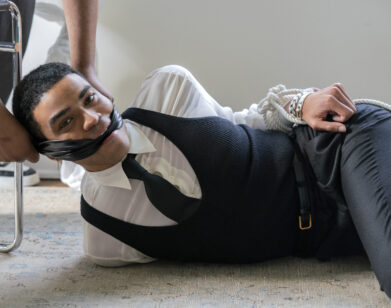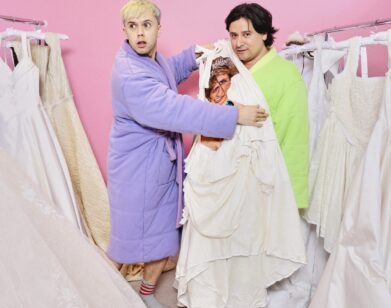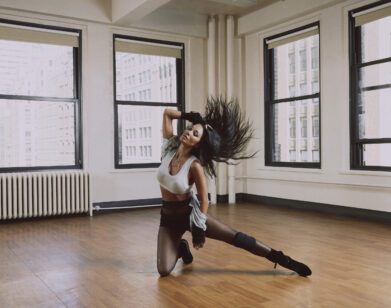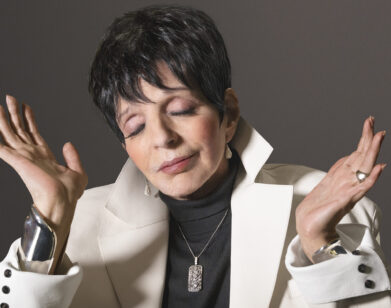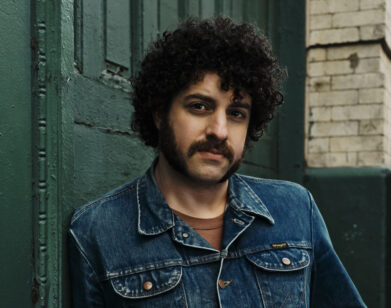Ethan Hawke Steps Out of True West to Tell Us About Smashed Typewriters, Toast, and Sam Shepard’s Final Wishes

Sam Shepard’s True West has long stood as a staging area for actors we now associate with raw (and sometimes frayed) masculinity. From its premiere in 1980, at San Francisco’s Magic Theater, the two-act, two-character play, which tells a story of fraternal warfare between brothers Austin and Lee, has had an A-list cast of angry men as leads. Peter Coyote, Tommy Lee Jones, Peter Boyle, Gary Sinise, John Malkovich, James Belushi, Erik Estrada, Dennis Quaid, Randy Quaid, Philip Seymour Hoffman, John C. Reilly, and Bruce Willis are of a few of the names to play the brothers (or in the case of Hoffman and Reilly’s production in 2000, both Austin and Lee, alternating each night). Ethan Hawke and Paul Dano are the latest duo to play Cain and Abel in the desert. The pair are midway through a 100-plus-date run of shows with New York’s Roundabout Theater Company in a production director by James MacDonald. Their True West been called “smoldering” and a “nightmare.” Before Shepard’s death in 2017, the Pulitzer-prize winning playwright selected MacDonald as director and Hawke as Lee to helm the production. Thanks to the pair’s experience with Shepard’s work, the play rolls out like a modern noir, brutish and fragile. Hawke cries as much as he screams with Dano in tow for nearly two caustic hours. Interview recently caught up with Hawke on the phone, en route to a pair of Saturday performances, to see where two months of on-stage ferocity have left him, psychologically speaking. Hawke explained his relationship to Shepard, the man, the difficulty of leaving behind difficult characters, and the need for utter precision when destroying a typewriter with a golf club.
———
NATHAN TAYLOR PEMBERTON: Late in True West there’s a scene that’s total chaos. Everything comes apart. The set is in ruins. You smash a typewriter with a golf club. How long does it take to find a rhythm for such a destructive moment?
ETHAN HAWKE: The truth of the matter is that I really love to smash it so hard that the golf club comes apart, but golf clubs, believe it or not, are expensive, especially if you go through eight of them a week. I have to be careful not to ruin the golf club. I got scared shitless, one time, because I hit that typewriter so hard the head of the golf club came flying out. It went right out the window. It scared the hell out of me because if it had gone the other way, I could’ve killed somebody. I don’t do that anymore. I’m trying to save lives here.
PEMBERTON: Ninety something performances into this run, are you at all questioning what you’ve gotten yourself into? A play this physically intense?
HAWKE: I really did completely underestimate the challenge of it. [HAWKE yells inaudibly to someone.] I’m sorry, somebody’s shouting at me on the street. I remember Phil Hoffman always saying this is the hardest play he ever did. I remember thinking, “Oh, it seems like it’s so much fun.” If you do it right, it seems like a ball, but there’s something about the darkness at the heart of this play that’s very powerful and hypnotic. Paul and I are either attacking or being attacked for two and a half hours. It’s just on from the second you walk on stage. You’re either getting hit or you’re hitting.
PEMBERTON: You’re circling each other for two hours.
HAWKE: We just have each other up there. I’m friends with James McBride, the author, and he once said Sam Shepard is using a two-string guitar, but he’s playing Beethoven on it. That’s a great comparison. The run is so limited. I know it’s gonna be one of those times that I’m sad when it’s over, when people didn’t see it — it’s rare that you feel so thoroughly chewed up and spit out by something. It feels good, in a way, to be kind of pressed to the wall of your abilities.
PEMBERTON: It’s like you’re in a state of perpetual training.
HAWKE: Yeah, exactly. I should sleep in a coffin.
PEMBERTON: I’m curious, what does it smell like on stage? Throughout True West, both you and Paul drink a case of beer, a few bottles of whiskey. There’s toast, some faux-urination. It’s looks odorous, to say the least.
HAWKE: It really just smells like toast. The aroma of toast is permeating the whole stage. But, I do have this bet with myself that, on the last performance, every shot of whiskey and every beer will be real, and I’ll get absolutely sloshed as I do the show because I won’t have to do it again. Then, it’ll really stink.
PEMBERTON: I have to ask, your character’s delivery has a very worn-in quality to it. It’s that up-all-night, haggard sounding, hoarse voice. How do you get that 5:00 AM vocal quality?
HAWKE: That’s easy, just be me. There’s some kind of shamanistic thing that can take place with acting, where the role is kind of invited into you. My wife asked me to work harder at leaving Lee at the theater because he permeates your whole existence while you’re playing him. These plays get into you. They’re like an incantation or a guided meditation on the subject matter — in this case masculinity and family and anger and loss and fear. It invites all this stuff inside of you. It impacts your voice, and it impacts the way you carry yourself. You’re not even conscious if it’s working.
PEMBERTON: So how do you leave Lee behind, and what does it look like when he comes out of the theater with you? Do you go into a bodega and knock over a rack of bread or something?
HAWKE: I don’t know. There are few times in my life when I’ve really intersected correctly with a role, and it vibrates through your whole life — not necessarily in a positive way. The truth of the matter is actors spend a lot of time trying to figure out how to conjure a character and how to invite a character into them. You know the expression: trying to get into character. But, there’s no guidebook about how to shake it off. It brings up some fascinating questions about the nature of identity and personality. What’s flexible and what’s not. Really, what I do is I take a shower, and I listen to some music that Lee wouldn’t listen to.
PEMBERTON: What kind of music?
HAWKE: Van Halen.
PEMBERTON: I feel like Lee would listen to Van Halen.
HAWKE: Yeah, Lee would. He totally would listen to Van Halen. What am I saying? I’ve lost all boundaries. I am Lee. Okay, classical music, for example. You can listen to some classical music and it really helps.
PEMBERTON: Having worked with Sam Shepard directly, did you ever get a glimpse of the origins of the darkness you mentioned or primal energy of this play?
HAWKE: 100 percent, absolutely. He would have a look in his eyes. There were galaxies in there. He was never at home in the city. He was always waiting to leave whenever he was here. He used to say this great thing that, whenever the author was around at rehearsal, there would always be a case of mistaken identity. That everyone who thought the person that wrote the play was literally the author. He was joking, and he was serious about it. But his point was: If your writing is any good, you don’t really know where it comes from.
PEMBERTON: You’ve done a few Sam Shepard plays, now, including Buried Child and A Lie of the Mind. With this experience, do you have any better insight as to what he would have wanted from this specific production of True West?
HAWKE: I acted with him a couple times. He played my dad in a couple different movies, so I’ve had a lot of fascinating experiences with him, but this was my first go at True West. I didn’t really talk to him much about it. One of the privileges of this production is it’s the last one his DNA is in. Meaning he hired the director, and he hired me, and then he passed. [Shepard died in 2017.]
I do know that he wanted us to remind people that, ever since Phil Hoffman and John C. Reilly did that very famous production where they switched roles every night, that Austin and Lee were not the same people. Sam really wanted us to reclaim the play, how it was written. Specifically, that one character is at least 10 years older than the other. They really are two very different men, but each has the same animal inside of them. That was our mission, and then it was kind of wonderful when we realized that Paul could do this. Wasn’t he gonna be on this call?
PEMBERTON: If he was here, I’d ask how much the interplay between both of you has evolved after two months of playing these roles.
HAWKE: Austin and Lee are like these ying-yangs — whatever you wanna call it. There’s a flame burning out and a flame rising, and they’re constantly shifting and making that energy seamless. You see us working less and less. That’s what I hope is happening. It always feels good when the next line feels inevitable. When you’re not working for it. You just arrive there, and so, when I’m pouring whiskey on his head that isn’t an actor’s idea but just an inevitable result of the previous series of events. You always know you had a good show when you can’t remember it. When it’s at its best is when you have kind of no thought. I love it when that happens, a moment where Paul will go, “Hey, did you hurt yourself when you were looking for the pencil, and you jammed that fork in your hand.” That’s when you know. Oh, yeah, that was good.
PEMBERTON: How much do you communicate on the stage?
HAWKE: We communicate the same way musicians communicate when they’re on stage. You don’t talk, but I know exactly what he’s thinking. I know exactly when Paul is in the pocket, and when Paul’s ankles are bothering him, but we don’t have to talk about it. I mean, we rarely say anything to each other after the show. We’ve listened to each other long enough. Hold on a second. [HAWKE to someone off the phone: Did you get tacos? You son of a bitch!] I just saw Paul. He beat me to the taco place.

